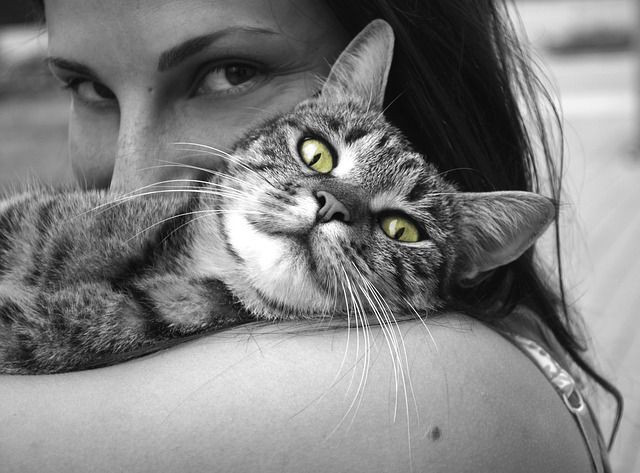International Cat Day 2016: 4 Health Benefits And Risks Of Having A Feline Friend

On International Cat Day, we take time to appreciate our favorite furry friends. But while we known that cats are guaranteed to warm our heart and soul with their antics, there are actually several health benefits (and a few health risks) to having a feline pet.
Heart Health
Petting your cat isn’t just relaxing for the pet, it can also be beneficial to the owner. Petting a cat can cause a drop in blood pressure due to release of oxytocin, a hormone linked to emotional bonding. This is the same hormone that gets released when we hug another person or when a mother breastfeeds her baby. This reduction in blood pressure and stress may have long-term benefits. One study from the University of Minnesota's Stroke Research Center found that, over a 10 year follow-up period, cat owners showed a 30 per cent lower risk of death from heart attack compared to non-cat owners.
Companionship
Having a cat could help alleviate your mood. A 1980 study on one-year survival of patients after discharge from a coronary care unit found that patients who were discharged and who had pets at home had a better survival rate for the next year compared to those who didn't. In addition, according to a survey of Elderly Pet Owners Regarding the Benefits of their Pets, 82 percent of respondents said owning a pet made them feel better when they were sad, 65 percent said simply petting their pet made them feel better, and 57 percent said they told their fears and worries to their pets. Cats especially can provide emotional support and companionship to their owners, and Health Fitness Revolution reported the companionship of felines is often preferred due to their sensitivity and intelligence.
Therapy Pets
Autistic children may especially benefit from having a pet cat. A 2012 study found that children with autism who had a pet after the age of 5 were more likely to be better at offering to share and offering comfort to others when compared to similarly impaired children. Cats specifically are becoming a more popular therapy-pet for ASD children because many children feel they can relate more to the feline’s reserved and pensive characteristics.
Allergy Reduction
What’s more, having a cat in the household may also help to reduce children’s risk of serious health problems later on. A 2012 Finnish study which followed 397 kids from childbirth to age one found that animal contact at an early age leads to a stronger immune system that combats infectious respiratory illness and lowers the risk for allergies later on in life.
Still, Be Careful
Of course, there are a few health risks to owning a cat, as with any pet. For example, the parasite Toxoplasma gondii is found in abundance in cat feces and when accidentally ingested by humans can cause toxoplasmosis, a serious medical condition. Severe toxoplasmosis may cause damage to the brain, eyes, or other organs, the Centers for Disease Control and Prevention reported. However, severe cases are more likely in individuals who have weak immune systems, though occasionally, even persons with healthy immune systems may experience eye damage from toxoplasmosis. In addition, a cat’s mouth is also filled with dangerous bacteria and can cause serious infections in humans if they accidentally lick an open wound.
This International Cat Day, take time appreciate just how much of a positive affect your furry friend may have had on your health, and make sure to steer clear of their litter box and sand-paper tongue.
Published by Medicaldaily.com



























